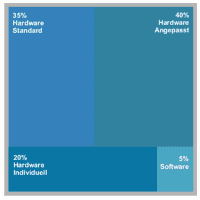GTC | hematec GmbH
General terms and conditions
Section 1 Validity
(1) All deliveries, services and offers from the Vendor are executed based exclusively on these General Delivery Conditions. They are an integral part of all agreements concluded between the Vendor and the contracting parties (hereafter also referred to as the "Client") with regard to deliveries or services supplied by him. They also apply to all future deliveries, services or offers to the Client, even if they have not been agreed separately on an individual basis.
(2) Business conditions of the Client or of a third party shall not apply, even if validity is not expressly disputed by the Vendor in individual cases. Even if the Vendor refers to any document which includes or makes reference to the business conditions of the Client or of a third party, this will not constitute any agreement to the validity of such business conditions.
Section 2 Offer and conclusion of the contract
(1) All offers from the Vendor are non-binding and subject to change, wherever they are not expressly defined as binding or do not include a specific period for acceptance. Orders or offers can be accepted by the Vendor within fourteen days following receipt.
(2) Privity of contract between Vendor and Client is conditional solely upon the written sales contract between the two parties, including these General Delivery Conditions. This fully reflects all agreements between the contracting parties with regard to subject matter of the contract. Oral agreements by the Vendor prior to conclusion of this contract shall not be considered binding, and verbal understandings between the contracting parties are superseded by the written contract, unless it is expressly stated therein that they will continue to be binding in each case.
(3) Amendments and modifications to the stipulated agreements, including these General Delivery Conditions, are valid only in written form. With the exception of executives and authorized representatives, employees of the Vendor are not entitled to make any oral agreements which deviate from these conditions. Confirmation via fax is sufficient to meet the written form requirement, whereas other telecommunication transmissions, and emails in particular, do not fulfil these requirements.
(4) Details provided by the Vendor relating to delivery or service (e.g. weights, dimensions, utility values, capacity, tolerances and technical data), as well as our representations of same (e.g. drawings and illustrations) are only approximations, provided that exact details are not stipulated as requisite in the contract. Such specifications should not be considered guaranteed characteristics, but rather as descriptions or identifications of the delivery or service. Deviations which are customary in the trade, which are the result of legal provisions or which represent technical improvements, as well as the substitution of components with equivalent parts is permissible as long as the intended function stipulated in the contract is not compromised.
(5) The Vendor retains the right of ownership or copyright for all offers and price quotations submitted by him, as well as all drawings, illustrations, calculations, brochures, catalogues, models, tools and all other documents and resources made available to the Client. The Client is not at liberty to make these items available to third parties, convey the content of such or to utilize or allow utilization or copying of these items without the explicit approval of the Vendor. Upon request of the Vendor, the Client must return these items in their entirety and destroy any existing copies, wherever they are no longer needed for the purposes of normal business activities or if negotiations do not lead to conclusion of a contract.
Section 3 Prices and payment
(1) The prices apply for all deliveries and services defined in the order confirmations. Special services or added performance is calculated separately. All prices are quoted in EURO ex works, plus packaging, statutory value-added tax and customs duty in the case of exports, as well as fees and other public charges.
(2) If the prices agreed upon are based on list prices and delivery is to be made more than four months after conclusion of the contract, the list prices of the Vendor at the time of delivery apply (less an agreed percentage or fixed discount respectively).
(3) Invoiced amounts are to be paid within ten days from receipt of the invoice without any deduction, unless otherwise agreed in writing. The relevant date of payment is the date on which the payment is credited on the account of the Vendor. Cheques are considered successful payment only when they have cleared. If payment is not submitted by the Client by the due date, interest will be charged on the outstanding amounts from the day of default at a rate of 8 percentage points above the respective base rate; the assertion of claims for higher rates of interest and additional damages in the event of default remains unaffected.
(4) Offsetting with counter-claims by the Client or the withholding of payment against such claims is permissible only insofar as the claims are undisputed or are legally binding.
(5) The Vendor is entitled to execute or fulfil outstanding deliveries or services only against advance payment or security wherever circumstances emerge following conclusion of the contract which give reason to doubt creditworthiness of the Client and which may compromise the payment of outstanding claims by the Vendor from the relevant contractual relations (including those from other individual orders for which the same framework contract applies).
Section 4 Delivery and delivery period
(1) Deliveries are made ex works.
(2) Delivery periods and deadlines announced for deliveries and services by the Vendor in advance are always approximations, unless a fixed deadline or a fixed date is expressly approved or agreed upon. If shipping has been agreed, delivery periods and deadlines refer to the time of transfer to the freighter, the haulier or any other third party commissioned with the shipment.
(3) Notwithstanding his rights to defaulting on the Client's part, the Vendor may request an extension from the Client on periods for deliveries or services by the period of time in which the ordering party fails to meet his contractual obligations with respect to the Vendor.
(4) An extension period to be stipulated by the Client must total at least 14 days, commencing from the point of time at which the Vendor receives notice of the extension. Cases of dispensability for extension as an act of law remain unaffected in this regard.
(5) The Vendor is not liable for impossible delivery or for delays in delivery wherever this is due to force majeure or similar, unforeseeable events at the time of concluding the contract for which the Vendor cannot be held responsible (e.g. malfunctions of any kind, difficulties encountered in the procurement of energy or materials, transport delays, strikes, lawful lockouts, deficiencies in workforces, energy or raw materials, difficulties encountered in acquiring essential official permits, official interventions or failed, incorrect or overdue delivery from suppliers). Where these events make it difficult or impossible for the Vendor to supply the goods or services and the delay proves to be not just temporary, the Vendor is entitled to withdraw from the contract. In the event of hindrances of a temporary duration, the delivery or service periods shall be extended or postponed by the period of the hindrance, plus an appropriate run-in period. If the Client can not reasonably be expected to accept delivery or services as a direct result of the delay, he may withdraw from the contract immediately by means of written notification to the Vendor.
(6) The Vendor is only entitled to partial deliveries wherever
– the partial delivery can be used by the Client within the scope of the contractual intended use,
– delivery of the remaining ordered goods is guaranteed and
– no significant additional costs are incurred for the Client as a consequence (unless the Vendor declares that he is willing to bear such costs).
(7) If the Vendor defaults in providing delivery or a service, or if the provision of delivery or a service is rendered impossible for whatever reason, then the Vendor's liability for compensation of damages is limited pursuant to Section 8 of these General Delivery Conditions.
Section 5 Place of performance, dispatch, packaging, transfer of risk, acceptance
(1) The place of performance for all obligations from the contractual relations is Steinbach-Hallenberg, unless otherwise specified. If the Vendor is also responsible for installation, the place of performance is the location at which installation is to take place.
(2) The mode of transport and type of packaging is open to the discretion of the Vendor.
(3) Risk is transferred to the Client no later than handover of the delivery item (applicable upon commencement of the loading procedure) to the freighter, the haulier or any other third party commissioned with carrying out the shipment. This also applies wherever partial deliveries are undertaken or wherever the Vendor is also responsible for the provision of additional services (e.g. dispatch or installation). If dispatch or handover is delayed due to circumstances which are solely the responsibility of the Client, the risk is transferred to the Client from the day on which the delivery item is ready for dispatch and the Client has been notified in this regard by the Vendor.
(4) The Client shall bear any storage costs incurred after risk has been transferred. If storage is arranged by the Vendor, the storage costs total 0.25 % of the invoiced amount for the delivery items being stored for each full week of storage. The right to claim for additional storage costs or to request proof of lower storage costs remain reserved.
(5) The shipment is insured against theft, breakage, transport, fire and water damage, as well as any other insurable risk, only at the express request and expense of the Client.
(6) Insofar as a formal acceptance is prerequisite, the purchased item is considered accepted when
– the delivery, including installation wherever installation is also the responsibility of the Vendor, has been completed,
– the Client has been notified in this regard by the Vendor referencing notional acceptance in accordance with Section 5 (6) and requested that he comply with the acceptance process,
– twelve working days have elapsed since delivery or installation or the Client has commenced utilization of the purchased item (e.g. the delivered system has already undergone commissioning) after only six working days following delivery or installation, and
– the Client has failed to accept the purchased item within this time period for reasons other than a defect indicated to the Vendor which would considerably impair the purchased item or render utilization impossible.
Section 6 Warranty, material defects
(1) The warranty period is two years from the date of delivery, or from the date of acceptance wherever acceptance is required.
(2) The delivered items are to undergo a meticulous inspection immediately following delivery to the Client or to a third party designated by the Client. The item is considered accepted if a notification of defects has not been submitted in writing to the Vendor with regard to discernible defects or other defects, which were immediately evident during the course of a meticulous examination, within seven working days following handover of the delivery item, or otherwise within seven working days following ascertainment of the defect, or at any earlier stage in which the defect became evident to the Client during normal utilization of the delivery item without the need for closer inspection, as stipulated in Section 2 (2) sentence 6. The rejected delivery item is to be returned to the Vendor with freight paid upon the request of the Vendor. If a notice of defect is justified, the Vendor will reimburse the costs for the most economic means of transport; this does not apply, however, if the costs have increased due to the delivery item being situated at a location other than the location of its intended use.
(3) The Client is obligated to convey any initial complaints by telephone or in writing, rather than immediately returning the purchased item, in order that the Vendor is given the opportunity to determine the cause of the defect over the telephone without incurring any shipping costs, and where necessary, allowing assignment of an RMA no. If the purchased item(s) is/are returned immediately, the Vendor is entitled to charge a flat rate inspection fee of 25.00 € plus sales tax at the statutory rate. In this case, expenses incurred for the purposes of supplementary performance, and in particular transport costs, are borne by the Client. Application of Section 478 BGB remains unaffected. Should it be determined following return of the purchased item as agreed, that the defect which is the subject of the complaint cannot be identified, the Vendor is also entitled to charge a flat rate inspection fee of 50.00 € plus sales tax at the statutory rate. If the Vendor then determines that the costs for the inspection were actually higher, he is entitled to invoice the higher amount, whereby an hourly rate of 75.00 € plus sales tax at the statutory rate is taken as a basis.
(4) If the delivered items exhibit material defects, the Vendor is initially obligated and entitled to repair them or to provide a replacement within a reasonable period of time. In the event of the failure, impossibility, impracticality, refusal or unreasonable delay in reworking defective goods or delivering replacement goods occurring a second time, the Client is entitled to withdraw from the contract or to reduce the purchase price to a reasonable extent.
(5) If the complaint of a defect is justified, the Client is entitled to withhold the purchase price limited to the sum of twice the prospective reworking/subsequent performance costs up to conclusion or completion of the reworking.
(6) Claims for defects do not apply in the case of only slight variation from the agreed quality or only a minor impairment of usability.
(7) Moreover, if the Vendor is responsible for the defect, the Client may demand compensation for damages in accordance with the conditions stipulated in Section 10.
(8) In the event of defective components from other manufacturers, which can not be rectified by the Vendor due to licensing regulations or for factual reasons, then the Vendor shall optionally assert his own warranty claims against the manufacturers and suppliers on the Client's account, or assign these to the Client. Warranty claims against the Vendor only exist for defects of this kind under other conditions and in accordance with these General Delivery Conditions if the legal enforcement of the aforementioned claims against the manufacturers or suppliers was unsuccessful or is futile, for example due to insolvency. For the duration of the legal dispute, the limitation of all relevant claims of the Client against the Vendor does not apply.
(9) The warranty becomes invalid if the Client modifies the delivery item, or has the item modified by a third party without prior approval by the Vendor, thus rendering the rectification of defects impossible or unacceptably difficult. In all cases, the Client will bear any additional costs incurred for rectification of the defect as a direct consequence of the modification.
(10) If delivery of used items has been agreed with the Client in individual cases, this shall be effected with the exclusion of all warranties for defects. This exclusion of warranty shall not apply in cases of intent or fraudulent concealment of a defect, as well as for instances of culpably caused physical injury or harm to health, or in the case of claims according to the Product Liability Act.
Section 7 Flat rate compensation for damages
If the Client rejects acceptance of the goods without any justifiable reason, or if he withdraws from the contract without providing the requisite legal reason for withdrawal, the Vendor can claim a flat rate compensation for damages to the sum of 25 percent of the agreed net purchase price. The Client is permitted to demonstrate to the Vendor that no damage, or significantly less damage actually occurred. The Vendor is permitted to demonstrate that a higher degree of damage occurred.
Section 8 Liability for compensation of damages due to default
(1) Liability of the Vendor for compensation of damages, for whatever legal reason, and in particular due to impossibility, default, faulty or incorrect delivery, breach of contract, violation of obligations during contract negotiations and unlawful acts, is limited insofar as there is a question of blame in each case, pursuant to Section 8.
(2) The Vendor is not liable in the case of simple negligence by his executive bodies, legal representatives, employees or other vicarious agents insofar as this does not involve a violation of contractual obligations. Essential contractual obligations include the commitment to punctual delivery and installation of the delivery item free of any major defects, as well as consultation, protection and duty of care obligations which should facilitate utilisation of the delivery item by the Client as stipulated in the contract, or for the purpose of safeguarding the physical wellbeing of the Client's personnel or the protection of his property against major damage.
(3) Insofar as the Vendor is liable for damage as stipulated in Section 8 (2), this liability is limited to damages which were foreseen by the Vendor at the time of concluding the contract as a potential consequence of breach of contract or which he should have foreseen as part of the due diligence process. Furthermore, indirect damage and consequential damage resulting from defects of the delivery item are only compensable wherever such damage is typically to be expected with normal utilization of the delivery item.
(4) In the event of liability for simple negligence, the Vendor's obligation to compensate material damage and any further financial losses as a consequence is restricted to a sum of 250,000.00 € for each individual claim for damage, even if this involves a violation of contractual obligations.
(5) The aforementioned exclusions of liability and limitations of liability apply to the same extent for the executive bodies, legal representatives, employees and other vicarious agents of the Vendor.
(6) Insofar as the Vendor provides technical information or acts as an advisor, and this information or advice is not part of the contractually agreed scope of services which he is under obligation to provide, this is provided free of charge and with the exclusion of any liability.
(7) The limitations of Section 8 do not apply for liability of the Vendor with regard to wilful conduct, for guaranteed characteristics, as a result of physical injury or harm to health or owing to stipulations in the Product Liability Act.
Section 9 Reservation of ownership
(1) Goods delivered by the Vendor to the purchaser remains the property of the Vendor until all secured claims have been paid in full. The goods and the goods covered by the retention of ownership in this clause are hereinafter referred to as Reserved Goods.
(2) The purchaser stores the Reserved Goods free of charge for the Vendor.
(3) The purchaser is entitled to process and sell the Reserved Goods until the enforcement event comes into effect (paragraph 8) in the normal course of business. Pledging and assignment as security are not permissible.
(4) If the Reserved Goods are processed by the purchaser, it shall be agreed that processing is resulted in the name of, and for the account of the Vendor as manufacturer and the Vendor immediately acquires ownership or – if processing is resulted from the materials of several owners or the value of the processed item is higher than the value of the Reserved Goods – the joint ownership (fractional share of property) of the newly created item in relation to the value of the Reserved Goods to the value of the newly created item. In the event that no such acquisition of ownership should occur for the Vendor, the purchaser now already transfers his future ownership or – in the aforementioned ratio – co-ownership in the newly created object to the Vendor for reasons of security. If the Reserved Goods are combined with other items to a unitary item or inseparably mixed and of one of the other items is to be regarded as the main item, the Vendor, insofar as he is the owner of the main item, hereby transfers co-ownership of the unitary item proportionally to the purchaser in the ratio stated in sentence 1.
(5) In the event that the Reserved Goods are sold on, the purchaser hereby transfers the resulting claim against the acquirer– or in case of co-ownership of the Vendor of the Reserved Goods in proportion to the proportion of co-ownership – to the Vendor by way of security. The same applies for other claims which replace the Reserved Goods or arise in regard to the Reserved Goods, e.g. insurance claims or claims for misconduct in case of loss or destruction. The Vendor revocably authorises the purchaser to collect the receivables assigned to the Vendor on his behalf. The Vendor may only revoke this authorisation in the event of a claim.
(6) In the event of Reserved Goods being seized by a third party, in particular by way of attachment, the purchaser shall advise such third parties immediately of the Vendor's ownership and notify the Vendor in this regard so as to enable the Vendor to enforce his ownership rights. Insofar as the third party is incapable of recompensing the Vendor for any legal or extra-judicial costs accrued in this regard, the purchaser is liable for such costs to the Vendor.
(7) The Vendor shall release Reserved Goods or the items or claims taking the place of Reserved Goods at his discretion upon request, provided their value exceeds the amount of the secured claims by more than 50%.
(8) Should the Vendor withdraw from the contact due to a violation of the contract – and in particular for default of payment – (enforcement event), he is entitled to demand the return of the Reserved Goods.
Section 10 Final provisions
(1) The place of jurisdiction for all disputes resulting from the business relationship between the Vendor and the Client is Steinbach-Hallenberg at the discretion of the Vendor, or the headquarters of the Client. Steinbach-Hallenberg is the exclusive place of jurisdiction for any and all claims filed against the Vendor. Mandatory statutory provisions regarding exclusive places of jurisdiction remain unaffected by this regulation.
(2) The relationship between the Vendor and the Client is exclusively subject to the laws of the Federal Republic of Germany. The United Nations Convention on Contracts for the International Sale of Goods dated 11th April 1980 (CISG) does not apply.
(3) If the contract or these General Delivery Conditions contain loopholes, then legally valid regulations are to be applied in order to fill these loopholes, as would have been agreed by the contracting parties in keeping with the economic objective of the contract and the purpose of these General Delivery Conditions, had they been aware of these loopholes from the outset.
Note:
The Client acknowledges the fact that the Vendor stores data from the contractual relationship in accordance with Section 28 of the German Federal Data Protection Act for the purposes of data processing, and reserves the right to transfer this data to third parties where necessary for execution of the contract (e.g. insurance companies, shipping providers).
Further information regarding data protection can be obtained at https://www.hematec.com/en/privacy-policy.















